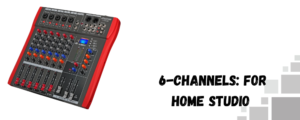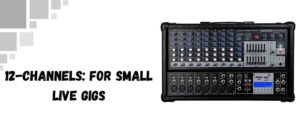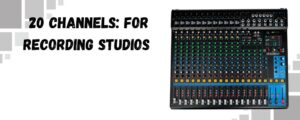If you’ve ever walked into a music store or scrolled through mixer listings online, you know the feeling: row after row of mixers with 6 channels, 12 channels, 20 channels… and you’re left wondering, “Do I actually need all that?”
The truth is, most people either overbuy or underbuy when it comes to mixers. Some grab the cheapest little box they can find, only to discover they’ve run out of inputs after plugging in a mic and a guitar. Others go all-in on a massive 20-channel desk that looks great but never gets used beyond four or five channels.
Even the best drum mic setup can fall flat without a proper audio mixer to shape the sound, balance levels, and route signals effectively. As Gear4Music’s Live Sound Mixing Guide explains, the mixer acts as the central hub—managing everything from gain staging and EQ to panning and feedback prevention—so every drum, cymbal, and mic blend seamlessly into a cohesive live mix.
So let’s clear the confusion. How many channels do you really need? The answer depends entirely on what you’re doing with your setup.
For Home Studios and Podcasters
If you’re recording at home, chances are you don’t need a monster board. Most podcasters and small studio folks work with just a couple of microphones, maybe a guitar or keyboard, and playback from a laptop.
That’s where something like the 5 Core MX-6CH audio mixer makes sense. Six channels give you breathing room without being overkill, and you still get handy extras like phantom power, EQ control, and even Bluetooth. Perfect for someone who wants professional sound without turning their desk into a cockpit.
Keep your setup simple with six channels that cover everyday recording needs.
For Bands and Small Live Gigs
Now, if you’re in a band—or even just running live sound for a small group—the math changes. Think about it: drums alone can chew up half your channels if you’re mic’ing them properly. Add vocals, guitars, bass, maybe a keyboard, and suddenly that tiny mixer isn’t cutting it.
This is where a 12-channel option like the 5 Core Powered Mixer comes into play. You can have a full band mix and modern amenities like USB, MP3 and Bluetooth.
12 channels are of the right balance of power and portability in the case of bar gigs, rehearsals or small events.
Handle full band mixes with a compact 12-channel board built for live shows.
For Larger Studios and Event Setups
If you’re running a more serious setup—a recording studio with multiple instruments tracked at once, or live events with multiple vocalists, instruments, and playback sources—you’re going to want a bigger board.
This is when you should be looking at something like the 5 Core MX-20CH audio mixer. It has 20 inputs, integrated effects, and USB capability. It is designed to do the heavy lifting that one requires and not casual clattering. Although not to all, it can save a life in case you have intricate mixes.
Run complex setups smoothly with twenty channels and built-in effects at hand.
So… What’s the Magic Number?
There isn’t one. And that’s the catch. Your “right” mixer depends on your reality, not the shiny product page. Ask yourself:
- How many microphones or instruments will I actually use at once?
- Am I recording solo, or do I need to handle a full band?
- Will I use it mostly at home, or do I need something rugged for live shows?
For a solo podcaster, six channels might be plenty. For a gigging band, twelve channels are the sweet spot. And for pros with complex setups, twenty isn’t overkill—it’s necessary.
Conclusion
Buying a mixer doesn’t have to feel like a gamble. Start with your actual needs, not what looks cool on paper. Six channels can cover most home studios. Twelve gives live performers plenty of room to breathe. Twenty is for when you’re running the big leagues.
If you keep that in mind, you’ll end up with a mixer that actually fits your workflow, not just your wishlist.
The best mixer is the one that helps you stop fiddling with knobs and start creating.
Here you can find amazing drum thrones; alternatively, browse our product page to find the best keyboard bench, audio mixers, drum mics, piano bench, keyboard stand, speakers, party speakers, and more.




